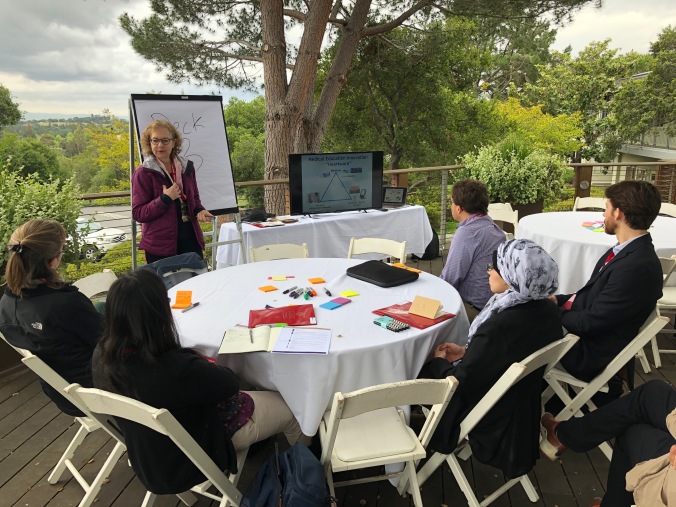 Two weeks ago I presented my Flourishing Treatment Approach (FTA) at Stanford Medx. The conference theme was innovation in medical education. The FTA is surely one.
Two weeks ago I presented my Flourishing Treatment Approach (FTA) at Stanford Medx. The conference theme was innovation in medical education. The FTA is surely one.
It is a science- and neurology-based method of working with people, seeing them as resilient beings with strengths and capacities. The FTA and its tools recognize the possibility of flourishing in life with a chronic condition, not merely coping. Even, and often, not despite but because, of one’s condition.
While the number of attendees was small, around 150, immediately apparent was how many “patients” were participating. My hat’s off to this conference which says it is the intersection of people, technology and design, placing patients and caregivers at the center of medical education, in partnership with medical learners and teachers.
Many people were walking with the use of canes, others with a slower gait, others with heads covered by colorful scarves. Adam, whom I met, has a brain tumor and a prognosis of three years to live. Yet he and everyone I met, while at moments facing their hard truths, were inspiring.
The day before the conference began one of my heroes, Dr. Victor Montori, Professor of Medicine at the Mayo Clinic, gave a Master class where we looked at how to fix our broken healthcare system.
Montori reminds me of the fabled character Don Quixote, brave against all odds. He spoke of the inherent conflict between healthcare, which is a profit-making business, and “care” as a means of individuals coming together in love and relationship, where clinicians come from service. Montori’s professional quest, beside being this emissary of care for his patients, is taking up the challenge to humanize and de-industrialize modern medicine.
“Without a relationship of love,” said Montori, “care cannot happen.” So while empathy was a centerpiece of the conference, along with design-thinking, few speakers were brave enough to say true empathy cannot happen without love.
I also admire the conference’s other keynote speaker Bon Ku, MD and Assistant Dean for Health and Design at Thomas Jefferson University. He gave a fascinating and revealing presentation on how design works and doesn’t work in today’s hospitals and education of medical students, and how we can design more caring communities.
The healing power of story-telling and story-listening, admitting to failures in medicine, changing our language to change thinking and attitudes, were all centerpieces of the conference, as well as an inspirational message from a doctor with a spinal cord injury who shared the bias he had encountered on his professional medical journey.
It is a ripe time to enlighten our medical students before they become fixed in what they learn to better understand the lived patient experience. Otherwise, how can we expect our future clinicians to be able to keep people healthy and well over the long term?
It is time we have more conferences like this that break down the walls between provider and patient and build bridges.
A beautiful article. Without love and compassion, there can be no care. More than medicines these patients desire to love and care, especially those who know they are not going to live for long. The idea behind organising such a health campaign wherein doctors, patients and caregiver come together is also an innovative one.